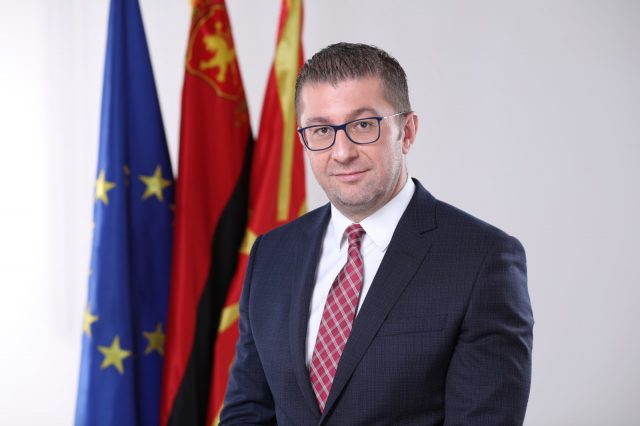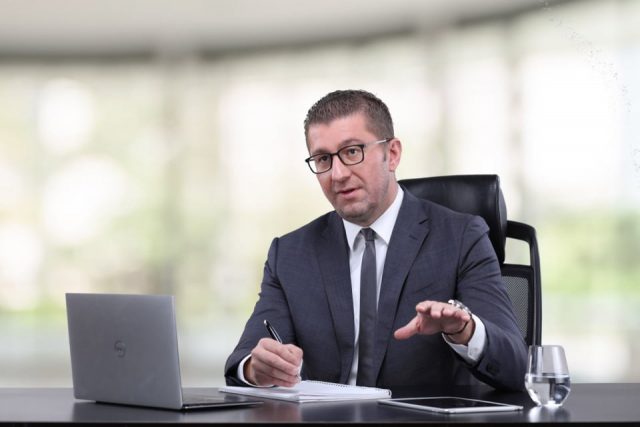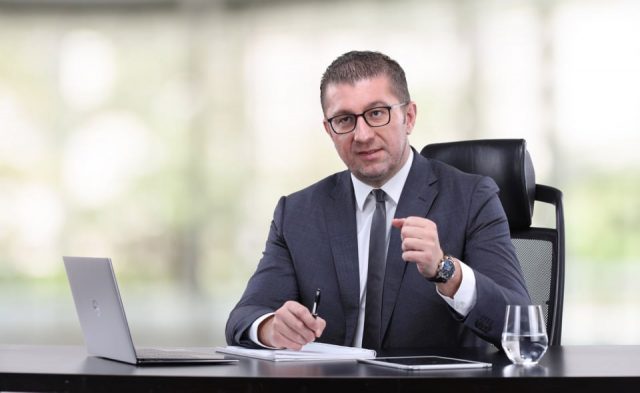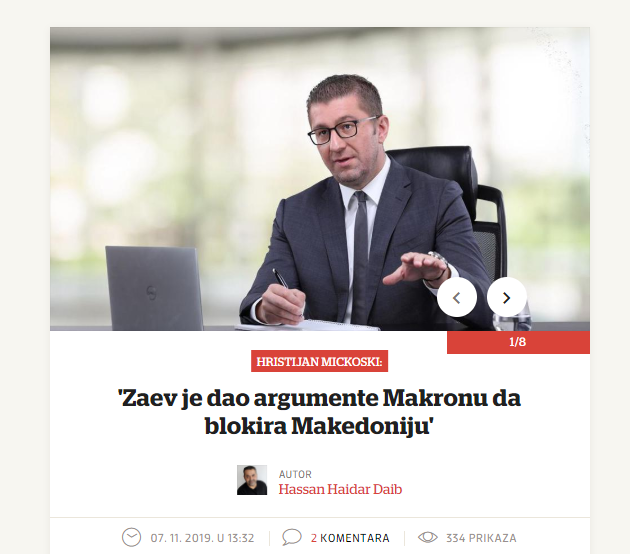In an interview with Croatian newspaper Vecernji List, VMRO-DPMNE President Hristijan Mickoski (42) says he does not think the EU has made an unfair decision to delay the start of accession talks with Macedonia, but believes that the decision is a consequence of the three-year disastrous policy of Zoran Zaev (45).
After the date for opening EU accession negotiations with North Macedonia was postponed, Prime Minister Zoran Zaev called for early parliamentary elections on April 12. Do you believe that the voters will punish Zaev as they punished Tsipras in Greece?
Mickoski: The mistake is huge and irreparable. Zaev will be remembered as our country’s most negative political figure in the last 28 years, and SDSM goes into opposition where it will have time to analyze who made mistakes and why they missed the opportunity to contribute something to the state and the citizens. The defeat of Tsipras is an internal matter of Greece, just as Zaev’s defeat will be our matter.

If you win the election, will you call a new referendum on returning the name Macedonia?
Mickoski: The referendum of 1991 is valid for us and I don’t see why we would call a new one. The people made a choice then. That is why we have not announced a new referendum. Our decisions will depend on the will of the citizens. Decisions should be wise and balanced. The fate of the Prespa Agreement will depend on the outcome of the election. If we have a stable parliamentary two-thirds majority in Parliament and a majority of MPs from other ethnicity other than Macedonian, the possibility of a step back opens up, otherwise a lot of work and reforms await us. Macedonia will soon become a full-fledged EU member, and will then correct the mistakes inside. There is no agreement that can stop me from being a Macedonian who speaks Macedonian and comes from from Macedonia. Our concept is NO to antiquisation and NO to northernisation, but a big YES and return of Macedonisation in Macedonia.
Did you expect that French President Emmanuel Macron would prevent the opening of North Macedonia’s EU accession negotiations after North Macedonia fulfilled all the conditions required?
Mickoski: When we say that Macedonia has fulfilled all the required conditions, we need to define what those conditions are. I can agree that we have fulfilled those conditions in which the opposition actively participated, here I mean the work in Parliament, the active participation in the process of harmonization of certain legal solutions, then the lobbying of VMRO-DPMNE with our sister parties to support a date for opening negotiations, rational and constructive behavior of VMRO-DPMNE despite all provocations by the Government and detention of members of the party’s Executive and Central Committee, etc…, but crime, corruption, political pressure on judges and prosecutors and the generally fake truth delivered by the government in Brussels remained an acute problem in our society. You know that when Zoran Zaev was mayor of Strumica, he was often suspected of having committed crimes in his work as mayor. The EU public may be forgetting, but the Macedonian public cannot forget that he was pardoned by President Crvenkovski for suspected crime and released by pressured and blackmailed judges in the “Bribe” case, when he shamelessly demanding a bribe from a citizen to do a job that he had to do as mayor ex officio. Perhaps he uses words that reflect European values in front of the curtain, but behind the curtain he is a mere despot. All of this was noticed by our EU allies and some of them sent messages that we need to urgently Europeanize ourselves at home and then move on to the EU.
You were against changing Macedonia’s name and you accused the Prime Minister Zoran Zaev of treason for changing the name of Macedonia in North Macedonia. Did you know that changing the name Macedonia will not be a ticket to the EU?
Mickoski: Not just VMRO-DPMNE, but also the majority of the citizens of Macedonia were against the Prespa agreement, changing the name and identity. The biggest political lie in independent Macedonia was the referendum question when citizens were asked to say whether they accepted the Prespa Agreement in order to join EU and NATO. It was perfectly clear to us that Zaev was lying again when he promised that after the change of the name and the identity, the EU doors would open. We warned that with the high level of corruption that we have, with the absence of the rule of law, without any reforms in education, administration and any other area, the chances of getting a date are significantly reduced. We have repeatedly called on the government to steal less and focus more on reforms. We have repeatedly pointed to scandals and affairs of the current government, and in response we have received silence and amnesty for crime from law enforcement authorities.

Why did Macron block the access negotiations?
Mickoski: I will have to correct you again. I think it was not a one-sided decision by President Macron, but by several member states who have arguments about the decision they made. What I do know is that they certainly have information about the “Racket” case and the ubiquitous corruption. I am sure that they have information about Zaev’s close contacts with the now detained media owner, who himself has characterized as pro-government. I am sure they were also informed about the abuses of Katica Janeva, which was Zoran Zaev’s red line when talking about the fate of the Special Public Prosecutor’s Office. I am sure that they were also informed about the racketeering of companies in the pharmaceutical industry or about Zaev’s pardon in the “Bribe” case, in which the whole public saw him asking for a bribe. We are talking about very influential countries to convince ourselves that they have made impulsive and unjustified decisions.
Do you believe Macron could change his decision?
Mickoski: If you ask me for my personal opinion on President Macron’s decision, I think the chances of that are minimal, especially if President Macron does not get firm arguments that the factual situation has changed and that giving Macedonia a date is a benefit for both France and the EU. What guarantees can President Macron get from Zaev? Will he swear he won’t steal anymore? Will he swear he will no longer exert pressure on the court and the prosecution? Will he swear to reform the state so that young people do not have to leave the country for survival? The man has been swearing for three years and nothing. He swore that there was no man who would change the name, and he changed it. Zaev has no dignity, and Europe does not fall for tears. A swift change of government is needed and a new political set-up which will be a stable and credible partner in which the international community will see the capacity and sincerity to deliver the necessary reforms. However, we must get as much support as possible in the elections to commit ourselves fully to the renewal of Macedonia.
Do you regard the announced accession of North Macedonia to NATO as a success achieved thanks to Zaev and the change of the country’s name?
Mickoski: NATO membership benefits Macedonia. When SDSM, the successor to the former Communist Party, waited to see what the Communist Party leadership would say in the 1990s, VMRO-DPMNE had already incorporated Euro-Atlantic integration into all its documents and doctrines. VMRO-DPMNE managed to bring the country to the NATO’s doorstep as early as 2008 by fulfilling all conditions. Macedonia has been a partner in NATO peacekeeping missions for years and has deployed its forces whenever needed. VMRO-DPMNE welcomes the NATO membership we deserved in 2008. VMRO-DPMNE only comments on the price paid by Zoran Zaev. We think that a dark politician like Zoran Zaev is blackmailed and there is a suspicion that he committed a crime to the detriment of the interests of the Macedonian people and Macedonia.

Prime Minister Zoran Zaev says his government has done everything the EU and NATO have asked for, including changing the name of the country, for which they hardly got a majority in Parliament, and that he feels deceived. Do you feel deceived as the leader of the main opposition party?
Mickoski: The Macedonian people feel deceived. Zaev came to power thanks to deceits. He did not win the election, but he formed a government. Zaev continued in that style. He was promising a 600km highway, and he didn’t build any. He promised clean air, and Skopje is among the five most polluted metropolises in the world. They were promising the return of young people, and everyday they are leaving with a one-way ticked, the planes and buses are full of educated staff who no longer see a future here. They promised to stop borrowing, and debts continue to grow, and there is no investment. He promised to fight crime and corruption, and there has never been more crime and corruption in the past than today, from the lowest to the highest levels in the government. I may have known and expected this kind of behavior from Zaev, but the citizens are surely deceived and will punish him.
If you win the election, will you form a coalition with some Albanian parties that betrayed you in the last election?
Mickoski: I want to believe in maturing and learning from mistakes. Zaev formed a government without majority and we saw that it did no good to anyone. Neither to Macedonians nor Albanians, Serbs, Croats, Turks, Roma, Bosniaks or anyone else. It brought only ridiculous, selfish, corrupt behavior and enormous crime. VMRO-DPMNE has always had coalition potential with the Albanian parties, but at the same time account must be taken of compliance with the program. It will be important for us to see the capacity and the will to implement appropriate reforms.
To what extent did the decision not to green-light accession negotiations with the EU destabilize Macedonia?
Mickoski: There is consensus in Macedonia on EU and NATO membership, both on political and ethnic lines. I do not see any serious force against such a pro-Western orientation. The services should have more information if there are any different movements, but so far we have not seen any reaction. There is always a risk that the Euro-skeptics will gain greater influence, but I am convinced that no country will depart from Euro-Atlantic perspectives. There is a risk that Zaev will transfer all the blame to the EU and France, but the citizens are wise and do not fall for Zaev’s lies anymore.
What is the economic situation in Macedonia like right now?
Mickoski: Every fifth Macedonian lives below the poverty threshold. Meaning not they don’t have enough money for summer vacation or studies, but they don’t have enough to buy food. Official figures say that over 500,000 citizens lack basic means for survival. We are last on the lists for foreign direct investments, nothing is being built, and the realization of the capital investments despite the low projections barely exceeds 1/3 of the planned. Healthcare is in chaos. Education and agriculture are on the verge of collapse. Macedonia sinks on Transparency’s corruption rankings. This is the image of Macedonia three years since Zaev is in power.





Comments are closed for this post.